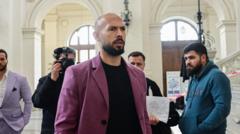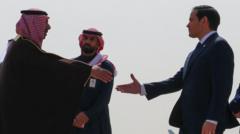Pete Marocco, a key figure in the Trump administration's approach to foreign aid, indicates a departure from traditional programs aimed at promoting democracy, as showcased through his interaction with Hungary's autocratic government.
Trump’s Foreign Aid Strategy Takes Shape: A Shift in Ideology

Trump’s Foreign Aid Strategy Takes Shape: A Shift in Ideology
A recent meeting between a State Department official and a Hungarian government representative highlights significant changes in U.S. foreign aid policies under the Trump administration.
In February 2025, Pete Marocco, a prominent official at the State Department, has been diligently overseeing substantial alterations to the United States' foreign aid mechanisms. Among his recent engagements was a meeting with Tristan Azbej, a representative of Hungary's government led by Viktor Orban, which marks a pivotal moment for U.S. foreign aid policy under the Trump administration. The meeting suggested a newfound alignment, where Marocco agreed to cease aid programs that “intervened” in Hungary’s domestic matters.
Following this, Hungarian Prime Minister Orban publicly declared that any media entities or pro-democracy organizations supported by the U.S. Agency for International Development (USAID) would henceforth be labeled as “illegal agents,” viewing the Trump administration’s initiatives to curtail aid as a beneficial “cleansing wind.” Orban has been instrumental in fortifying control over political dissent and media outlets while simultaneously fostering closer relationships with Russia, despite Hungary's NATO membership.
This incident underscores Marocco’s determination to reshape foreign aid in a manner congruent with Trump's ideological objectives, which diverges from the historical model of utilizing aid to promote democratic values and human rights abroad. Such developments signal a significant transformation in how foreign assistance is perceived and administered under the current administration, favoring alignment with authoritarian regimes over traditional democratic advocacy.
Following this, Hungarian Prime Minister Orban publicly declared that any media entities or pro-democracy organizations supported by the U.S. Agency for International Development (USAID) would henceforth be labeled as “illegal agents,” viewing the Trump administration’s initiatives to curtail aid as a beneficial “cleansing wind.” Orban has been instrumental in fortifying control over political dissent and media outlets while simultaneously fostering closer relationships with Russia, despite Hungary's NATO membership.
This incident underscores Marocco’s determination to reshape foreign aid in a manner congruent with Trump's ideological objectives, which diverges from the historical model of utilizing aid to promote democratic values and human rights abroad. Such developments signal a significant transformation in how foreign assistance is perceived and administered under the current administration, favoring alignment with authoritarian regimes over traditional democratic advocacy.























